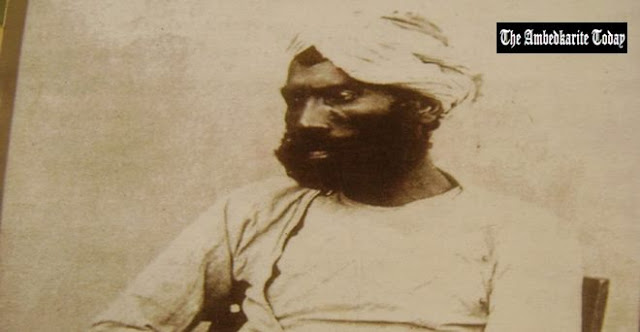The 1857 War of Independence, which the elites claim was started by Mangal Pandey, was actually inspired by Matadin Bhangi ( valmiki )
The Dalits have an emotional link with the 1857 War of Independence for they believe that it was initiated by them. They claim that the Soldier Revolt by the mostly Dalit Indian soldiers in the British Army that took place in Jhansi in 1857, snowballed into the War of Independence. It was a War of Independence since the Dalits were fighting for their motherland rather than to gain power.
The War was led by Bhau Bakshi and Puran Kori and with them was Jhalkaribai who fought bravely against the British for the sake of her motherland (Dinkar 1990: 62).
Matadin Bhangi was an Indian freedom fighter who played a key part in the events immediately preceding the outbreak of the Indian rebellion of 1857. He was a dalit sepoy in British East India Company. Mangal Pandey refused water to him as he was considered untouchable for being from Bhangi caste
The Dalit narrative of the first freedom struggle is filled with stories about brave women martyrs belonging to suppressed communities like Jhalkaribai, Avantibai, Pannadhai, Udadevi and Mahaviridevi (Dinkar ibid: 27).
According to them, the 1857 War of Independence, which the elites claim was started by Mangal Pandey, was actually inspired by Matadin Bhangi ( valmiki ) . The story is narrated in such a manner that Matadin Bhangi ( valmiki ) emerges as the source of inspiration for the revolt.
Their narrative is as follows:
‘There was a factory in Barrackpore where cartridges were manufactured. Many of the workers of this factory belonged to the untouchable communities. One day one of the workers felt thirsty. He asked a soldier for a mug of water. That soldier was Mangal Pandey. Mangal Pandey, a Brahmin, refused him water because the worker was an untouchable. This was very humiliating for the worker. He retaliated to the Brahmin soldier saying,
” Bara awa hai Brahaman ka beta. Jin kartuson ka tum upayog karat ho, unpar gaaye or suar ki charbi lagawal jaat hai, jinhe tum apan daatun se torkar banduk mein bharat ho. O samay tomhar jati aur dharam kahan jawat. Dhikkar tumhare is brahmanatwa ka ”
[You claim to be a highly respectable Brahmin, but the cartridges which you bite with your teeth and insert in your guns, are all rubbed with the fat of cows and pigs. What happens to your caste and religion then? Curse on your Brahminism]’ ‘Hearing this soldier was taken by surprise. That untouchable was none other than Matadin Bhangi, who opened the eyes of the Indian soldier and ignited the first spark of India’s independence in the Cantonment.
The words of Matadin Bhangi spread like wildfire through the Cantonment. Very soon the torch of independence was lighted. On the morning of 1 March 1857, Mangal Pandey broke the line during the parade. Accusing the British of hurting their religious sentiments, he started firing indiscriminately at them. This was the moment when the first battle lines against the British were drawn. Mangal Pandey was arrested in an injured condition.
He was court-martialed, and in 1857 he was hung from the gallows before all the soldiers. Mangal Pandey’s sacrifice became an inspiration for all the soldiers. On 10 May 1857, the floodgate of the independence movement burst in Barrackpore in which many brave sons of India became martyrs. In the chargesheet that was made, the first name was that of Matadin Bhangi, who was later arrested.
All the arrested revolutionaries were court-martialed. Matadin was charged for treason against the British.’ (Dinkar op cit : 37).
Nath (1998: 12) in his book ‘1857 Ki Kranti Ka Janak: Nagvanshi Bhangi Matadin Hela’ also narrates a similar story in which Matadin Bhangi has been claimed to be the father (janak) of the 1857 rebellion. In these narratives, Matadin Bhangi is presented as the moving force behind the 1857 Revolt.
They also try to show how the forward class refused to hand a glass of water to the untouchables although they bit cartridges rubbed with cow’s fat. Thus, these narratives, along with a description of the nationalist movement, questions the hierarchical structure of the Indian society. The rigid structure in which the untouchables are not allowed to go near the forward castes because of their low birth and ritual ‘dirtiness’ has been strongly criticised.
To prove the historicity of this event, a book written by one Shri Acharya Bhagwan Deb called ‘The immortal revolutionaries of India’, has been quoted by Dinkar (Dinkar op. cit.: 38). The memory of Matadin Bhangi and his contribution to the nationalist movement is celebrated in a number of ways by the Dalits. Many songs have been composed in his honour that are sung in rallies and functions, both cultural and political.
Plays are staged at commemorative functions held in his honour in towns and villages. Special issues of magazines are brought out with articles by eminent writers highlighting his contributions. A fortnightly newspaper Dalit Kesri published a special issue on the 1857 Revolt 7 in which the lead article was on Matadin Bhangi. Anarya Bharat, another Dalit newspaper that is published from Mainpuri in UP, brought out a special feature on the contribution of Dalits to the 1857 Revolt. In all these publications they projected Matadin Bhangi as a pioneer of the First War of Indian Independence.
Himayati, a Dalit literary magazine, in its May 1996 issue celebrating the memory of 1857 published a special feature and lead article on the contribution of Matadin Bhangi. Dr. Sohanpal Sumanakshar wrote very strongly in the same issue that the first person who sowed the seed of the 1857 revolution was Matadin Bhangi but unfortunately historians have forgotten his contribution.
Reference-

